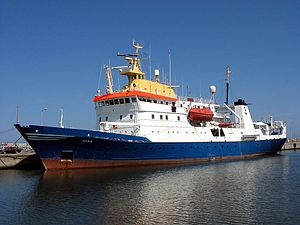
Back علم المصايد Arabic মাৎস্যবিদ্যা Bengali/Bangla Fischereiwissenschaft German Fiŝkapta scienco Esperanto Ciencia pesquera Spanish علوم و مهندسی شیلات Persian Kalataloustiede Finnish मत्स्योद्योग विज्ञान Hindi Ilmu perikanan ID 水産学 Japanese

Fisheries science is the academic discipline of managing and understanding fisheries.[1] It is a multidisciplinary science, which draws on the disciplines of limnology, oceanography, freshwater biology, marine biology, meteorology, conservation, ecology, population dynamics, economics, statistics, decision analysis, management, and many others in an attempt to provide an integrated picture of fisheries.[2][3] In some cases new disciplines have emerged, as in the case of bioeconomics and fisheries law. Because fisheries science is such an all-encompassing field, fisheries scientists often use methods from a broad array of academic disciplines.[4][5] Over the most recent several decades, there have been declines in fish stocks (populations) in many regions along with increasing concern about the impact of intensive fishing on marine and freshwater biodiversity.[6]
Fisheries science is typically taught in a university setting, and can be the focus of an undergraduate, master's or Ph.D. program. Some universities offer fully integrated programs in fisheries science. Graduates of university fisheries programs typically find employment as scientists, fisheries managers of both recreational and commercial fisheries, researchers, aquaculturists, educators, environmental consultants and planners, conservation officers, and many others.[7]
- ^ Lackey, Robert (2005). "Fisheries: History, Science, and Management". In Lehr, Jay; Keeley, Jack (eds.). Water Encyclopedia. Wiley. pp. 121–129. doi:10.1002/047147844X.sw249. ISBN 047147844X.
- ^ Leal, Donald; Maharaj, Vishwanie (2009). Evolving approaches to managing marine recreational fisheries. Lanham, MD: Lexington Books. ISBN 978-0-7391-2802-2. OCLC 232358037.
- ^ Hubert, Wayne A.; Quist, Michael C. (2010). Inland fisheries management in North America (3rd ed.). Bethesda, Md.: American Fisheries Society. ISBN 978-1-934874-16-5. OCLC 650960010.
- ^ Schreck, Carl B.; Moyle, Peter B., eds. (2002). Methods for Fish Biology (Reprinted ed.). Bethesda, MD: American Fisheries Society. p. 704. ISBN 091323558X.
- ^ Sass, Greg S.; Allen, Micheal S., eds. (2014). Foundations of Fisheries Science. Bethesda, MD: American Fisheries Society. p. 801. ISBN 978-1-934874-37-0.
- ^ Hart, Paul J.B.; Reynolds, John D., eds. (2002). Handbook of Fish Biology and Fisheries: Fish Biology, Volume 1. Wiley-Blackwell. p. 432. ISBN 9780632054121.
- ^ "Careers in Fisheries". American Fisheries Society. 2004. Retrieved May 19, 2020.
© MMXXIII Rich X Search. We shall prevail. All rights reserved. Rich X Search